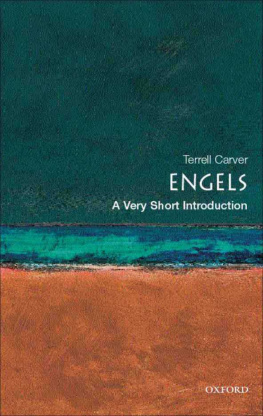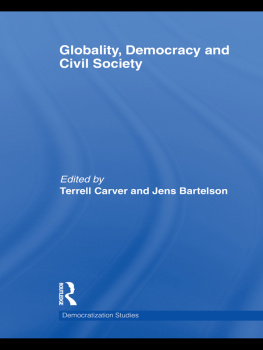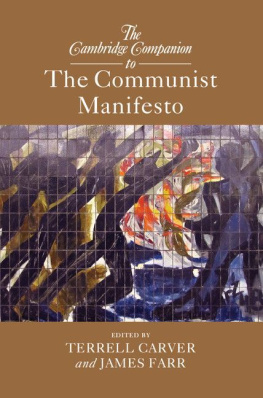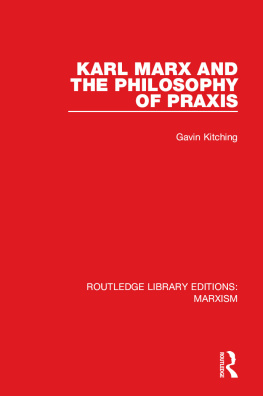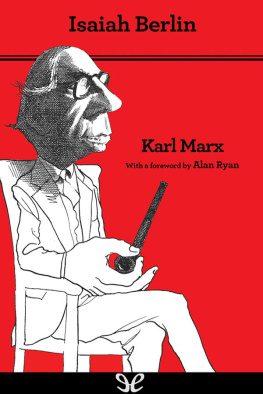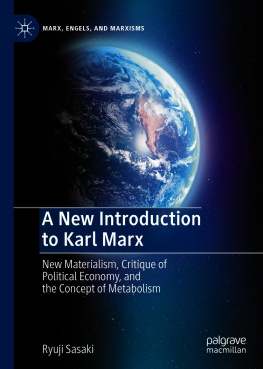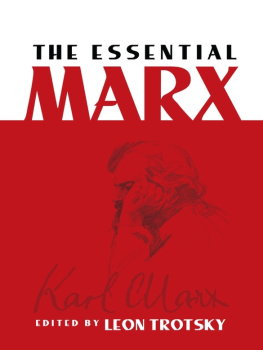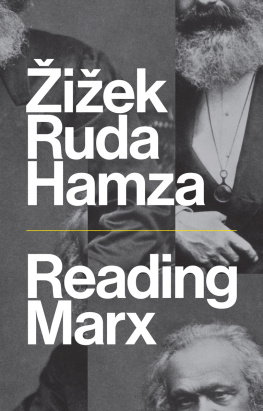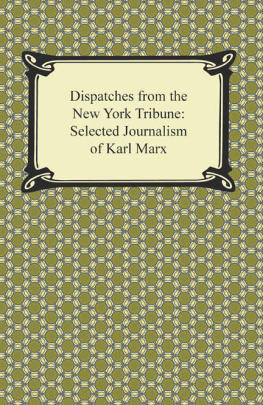
Series page
Classic Thinkers
- Richard T. W. Arthur, Leibniz
- Terrell Carver, Marx
- Daniel E. Flage, Berkeley
- J. M. Fritzman, Hegel
- Bernard Gert, Hobbes
- Dale E. Miller, J. S. Mill
- Joanne Paul, Thomas More
- A. J. Pyle, Locke
- Andrew Ward, Kant
Copyright page
Copyright Terrell Carver 2018
The right of Terrell Carver to be identified as Author of this Work has been asserted in accordance with the UK Copyright, Designs and Patents Act 1988.
First published in 2018 by Polity Press
Polity Press
65 Bridge Street
Cambridge CB2 1UR, UK
Polity Press
101 Station Landing
Suite 300,
Medford, MA 02155
USA
All rights reserved. Except for the quotation of short passages for the purpose of criticism and review, no part of this publication may be reproduced, stored in a retrieval system or transmitted, in any form or by any means, electronic, mechanical, photocopying, recording or otherwise, without the prior permission of the publisher.
ISBN-13: 978-1-5095-1817-3 (hardback)
ISBN-13: 978-1-5095-1818-0 (paperback)
A catalogue record for this book is available from the British Library.
Library of Congress Cataloging-in-Publication Data
Names: Carver, Terrell, author.
Title: Marx / Terrell Carver.
Description: Malden, MA : Polity, 2017. | Series: Classic thinkers | Includes bibliographical references and index.
Identifiers: LCCN 2017024089 (print) | LCCN 2017028216 (ebook) | ISBN 9781509518203 (Mobi) | ISBN 9781509518210 (Epub) | ISBN 9781509518173 (hardback) | ISBN 9781509518180 (pbk.)
Subjects: LCSH: Marx, Karl, 1818-1883.
Classification: LCC B3305.M74 (ebook) | LCC B3305.M74 C37 2017 (print) | DDC 335.4092dc23
LC record available at https://lccn.loc.gov/2017024089
Typeset in 10.5 on 12 pt Palatino by Toppan Best-set Premedia Limited
Printed and bound in the UK by CPI Group (UK) Ltd, Croydon
The publisher has used its best endeavours to ensure that the URLs for external websites referred to in this book are correct and active at the time of going to press. However, the publisher has no responsibility for the websites and can make no guarantee that a site will remain live or that the content is or will remain appropriate.
Every effort has been made to trace all copyright holders, but if any have been inadvertently overlooked the publisher will be pleased to include any necessary credits in any subsequent reprint or edition.
For further information on Polity, visit our website:
politybooks.com
Dedication
For my six (so far)
grandchildren
Acknowledgements
I am very grateful to numerous students and colleagues over the years who have contributed in incremental, but hugely important ways to this book, and have made it tremendous fun to write. Also heartfelt thanks to two assiduous reviewers who contributed greatly to the final draft. And I owe particular thanks to George Owers, editor at Polity Press, who thought that I might have something to say.
is an edited version of a previously published article: Terrell Carver, Making Marx Marx, Journal of Classical Sociology 17:1 (2017): 1027; used with permission.
Abbreviations
| CW | Karl Marx and Frederick Engels, Collected Works in 50 volumes (London: Lawrence & Wishart, 19752004). |
| EPW | Karl Marx, Early Political Writings, ed. and trans. Joseph OMalley, with Richard A. Davis (Cambridge: Cambridge University Press, 1994). |
| IWMA | International Working Men's Association, 186476. |
| LPW | Karl Marx, Later Political Writings, ed. and trans. Terrell Carver (Cambridge: Cambridge University Press, 1996). |
Timeline
| Date | Marx | Engels |
|---|
| 1818 | Born 8 May in Trier in Rhenish Prussia, now in Germany |
| 1820 | Born 28 November in Barmen in the Prussian Bergisches Land, now Wuppertal, in Germany |
| 1836 | Attends Bonn University |
| 1837 | Leaves school to work for family firm |
| 1838 | Attends Berlin University |
| 1841 | Receives doctoral degree from Jena University | Undertakes military service in Berlin and attends lectures at the University |
| 1842 | Writes articles for the Rheinische Zeitung in Cologne |
| 1843 | Marries Jenny von Westphalen, begins MSS studies (posthumously published as Critique of Hegel's Philosophy of Right) |
| 1844 | Moves to Paris, continues manuscript studies (posthumously published as Economic and Philosophical Manuscripts), and edits DeutschFranzsische Jahrbcher with Arnold Ruge, including two articles by himself and two by Engels | Writes The Condition of the Working Class in England; visits Marx in Paris with Outlines of a Critique of Political Economy |
| 1845 | Publishes The Holy Family by Engels and Marx, moves to Brussels and continues mss drafts with Engels (posthumously edited into book-form as The German Ideology) | Travels to Manchester with Marx |
| 1847 | Publishes The Poverty of Philosophy, and Discourse on Free Trade | Writes drafts for Communist League |
| 1848 | Publishes (anonymously) Manifesto of the Communist Party; moves back to Paris on invitation of revolutionary government, and then moves to Cologne | Works with Marx on the Manifesto and on the Neue Rheinische Zeitung |
| 1849 | Emigrates to London |
| 1850 | Edits revived newspaper as Organ of Democracy | Joins family firm in Manchester |
| 1851 | Writes The Eighteenth Brumaire of Louis Bonaparte, published 1852; begins writing for American and other newspapers and encyclopedias | Assists Marx with journalism and reference works |
| 1857 | Returns to substantial work on Critique of Political Economy (posthumously published as Grundrisse) |
| 1859 | Publishes half-volume A Contribution to the Critique of Political Economy | Publishes review of Marx's book |
| 1864 | Begins working with IWMA |
| 1867 | Publishes Capital, Volume 1 | Publishes reviews of Marx's book |
| 1869 | Retires from employment and moves to London |
| 1871 | Publishes The Civil War in France |
| 1872 | Revises Capital, Volume 1 for French translation |
| 1875 | Writes Marginal Notes (posthumously published as Critique of the Gotha Programme) |
| 1883 | Dies 14 March in Kentish Town, London | Delivers Graveside Speech |
| 1895 | Dies 5 August in Primrose Hill, London |
Introduction
Another Marx
Karl Marx's works have had a multi-faceted and multi-functional appeal to all sorts of audiences, political and otherwise, since the early 1840s, though during his lifetime (181883) he had relatively few readers and little if any fame. His first mass audience was in the partisan context of the international socialist movement of the later nineteenth century, and after that he occupied an iconic position in its rival communist successors and state-structures from the Bolshevik revolution in Russia in 1917 up to the fall of the Wall in Berlin in 1989. In a much more limited way this kind of twentieth-century Marx-worship persists into the present, though now mostly marginalized and increasingly tenuous. All through these posthumous developments the relationships between the historical real-life Marx, the Marxisms attributed to him, the iconic Marx of parade-banners, and the actual politics of Marxist movements, leaders and states has been a maelstrom of complex political, ideological and academic negotiations and conflicts. These processes have included the Cold War and Iron Curtain great-power confrontations, as well as formidable amounts of national liberation, revolution, subversion, intervention and regime change, together with considerable violence all across the globe.
Next page

